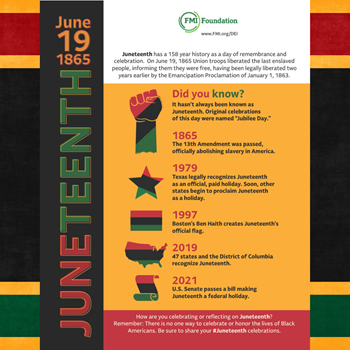<div><p paraid="1703854297" paraeid="{d620b8bf-04fd-4f93-83b7-fc66d0f23219}{161}"><span style="background-color:transparent;color:inherit;font-family:inherit;font-size:inherit;text-align:inherit;text-transform:inherit;word-spacing:normal;caret-color:auto;white-space:inherit;">By; David Fikes, Executive Director, FMI Foundation </span><br /></p></div><div><p paraid="1327400527" paraeid="{d620b8bf-04fd-4f93-83b7-fc66d0f23219}{177}"><img src="https://www.fmi.org/images/default-source/blog-images/juneteenth.tmb-large-350-.png?Culture=en&sfvrsn=8ea83c1a_1" style="float:right;margin:10px;" alt="Juneteenth" class="-align-right" sf-size="867603" />We live in a sound-byte world. Many, if not all, of us, are guilty of preferring to have our information spoon-fed to us in the smallest, most palatable doses possible. The problem with encapsulating things in a quick and clever way is that the reduction frequently overly simplifies facts, and the pill-sized version misses, messes with or totally obscures the point. If we want to fully appreciate and understand something we need to know the details, dive into the history, and pay attention to the nuances. Sometimes, quick and easy aren’t sufficient, and we must move beyond the sound-byte. That is the case with Juneteenth; a sound-byte approach does not do justice to the rich heritage that holiday holds. </p></div><div><p xml:lang="EN-US" lang="EN-US" paraid="249842881" paraeid="{43cb925d-606b-4f79-896e-429056e5945b}{32}">Juneteenth is a significant event in our nation’s quest for “liberty and justice for all. ”Officially known as Juneteenth National Independence Day, this annual commemoration of the end of slavery in the United States is observed on June 19. Like most historical happenings, there were many steps that took place before and after the events of the particular day. It is important we remember the detailed origins of the holiday because its history contains the lesson that not everything was accomplished in one 24-hour span AND there remains work to be done. </p></div><div><p paraid="425530455" paraeid="{7e1a2a22-1068-4312-a975-c4036b97b180}{58}">In the thick of the Civil War, President Abraham Lincoln promised freedom to enslaved people living in the rebellious parts of the Southern states when on September 22, 1862, he announced the Emancipation Proclamation would go into effect on January 1, 1863.Adoption and enforcement of the proclamation was slow and reliant upon the advances of the Union forces. Even though Confederate General-in-Chief Robert E. Lee’s surrender at Appomattox Court House on April 9, 1865, is often recognized as the official end of the Civil War, the Confederate Army west of the Mississippi River did not formally surrender until June 2.Even then, pockets of resistance continued, refusing to acknowledge the Emancipation Act as the law of the land. On June 19, 1865, Union Major General Gordan Granger arrived on Galveston Island and supported by a federal troop, 2,000 strong, he posted an ordinance in public places, informing all Texans that in accordance with a Proclamation from the Executive of the United States, all enslaved people were free. That bold definitive act is what we celebrate on Juneteenth, the fact that we’re still striving to realize the full meaning of the Emancipation Act remains the challenge of the holiday. </p></div><div><p paraid="590442984" paraeid="{7e1a2a22-1068-4312-a975-c4036b97b180}{126}">While June 19 took on the mantle marking the end of slavery in the U.S., the reality is emancipation for slaves in two Union border states, Kentucky and Delaware, would not take effect until the Thirteenth Amendment was ratified on December 6, 1865. Still celebrations of Juneteenth continued to grow in Texas with ebbs and flows during the Jim Crow era and the Great Depression. In 1938, James Allred, Governor of Texas, issued a state proclamation clarifying when Juneteenth should be celebrated indicating the holiday’s growing observance. As Black residents of Texas migrated north, east, and west, they took the tradition of celebrating Juneteenth with them. In 1979 the Texas legislature passed a bill making Juneteenth an official state holiday. More states followed suit, and eventually, on June 17, 2021, Juneteenth National Independence Day became a legal public federal holiday. </p></div><div><p paraid="1325908554" paraeid="{7e1a2a22-1068-4312-a975-c4036b97b180}{172}">In honor of the history and the rich traditions of Juneteenth, the FMI DEI committee has created two infographics – available for download – to help inform and amplify our national celebration of Juneteenth. One infographic focuses on <a href="https://www.fmi.org/docs/default-source/fmi-foundation/2023-fmi-foundation-juneteenth-history-infographic.pdf?sfvrsn=314d60c6_4" rel="noreferrer noopener" target="_blank">historical aspects of Juneteenth</a> and the other highlights the <a href="https://www.fmi.org/docs/default-source/fmi-foundation/2023-fmi-foundation-juneteenth-food-infographic.pdf?sfvrsn=14ef588_2" rel="noreferrer noopener" target="_blank">foods traditionally served in Juneteenth celebrations</a>. </p></div><div><p paraid="1758101226" paraeid="{7e1a2a22-1068-4312-a975-c4036b97b180}{196}">Let’s all move beyond the sound-byte and have a meaningful Juneteenth. </p><p paraid="1758101226" paraeid="{7e1a2a22-1068-4312-a975-c4036b97b180}{196}"><a href="https://www.fmi.org/industry-topics/diversity-equity-inclusion" class="button" target="_blank">Download the Infographics</a></p></div>
[#item_full_content]




